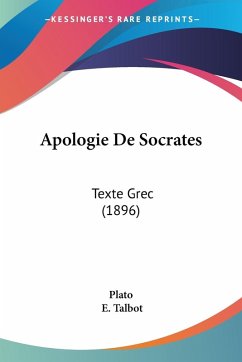
Entretiens Memorables De Socrate (1872)
Versandkostenfrei!
Versandfertig in 1-2 Wochen
32,99 €
inkl. MwSt.

PAYBACK Punkte
16 °P sammeln!
Entretiens M¿¿¿¿¿morables de Socrate est un livre ¿¿¿¿¿crit par Xenophon en 1872. Ce livre est une collection de dialogues entre Socrate et ses disciples, dans lesquels Socrate aborde des sujets tels que la vertu, la sagesse, la pi¿¿¿¿¿t¿¿¿¿¿ et la justice. Les dialogues sont bas¿¿¿¿¿s sur les enseignements de Socrate, qui a ¿¿¿¿¿t¿¿¿¿¿ un philosophe grec c¿¿¿¿¿l¿¿¿¿¿bre pour sa m¿¿¿¿¿thode de questionnement et de r¿¿¿¿¿flexion, connue sous le nom de m¿¿¿¿¿thode socratique. Le livre est consid¿¿¿¿¿r¿¿¿¿¿ comme une source imp...
Entretiens M¿¿¿¿¿morables de Socrate est un livre ¿¿¿¿¿crit par Xenophon en 1872. Ce livre est une collection de dialogues entre Socrate et ses disciples, dans lesquels Socrate aborde des sujets tels que la vertu, la sagesse, la pi¿¿¿¿¿t¿¿¿¿¿ et la justice. Les dialogues sont bas¿¿¿¿¿s sur les enseignements de Socrate, qui a ¿¿¿¿¿t¿¿¿¿¿ un philosophe grec c¿¿¿¿¿l¿¿¿¿¿bre pour sa m¿¿¿¿¿thode de questionnement et de r¿¿¿¿¿flexion, connue sous le nom de m¿¿¿¿¿thode socratique. Le livre est consid¿¿¿¿¿r¿¿¿¿¿ comme une source importante pour comprendre la philosophie de Socrate et son impact sur la pens¿¿¿¿¿e occidentale. Les Entretiens M¿¿¿¿¿morables de Socrate sont ¿¿¿¿¿crits en fran¿¿¿¿¿ais et sont disponibles dans de nombreuses ¿¿¿¿¿ditions et traductions.This Book Is In French.This scarce antiquarian book is a facsimile reprint of the old original and may contain some imperfections such as library marks and notations. Because we believe this work is culturally important, we have made it available as part of our commitment for protecting, preserving, and promoting the world's literature in affordable, high quality, modern editions, that are true to their original work.












